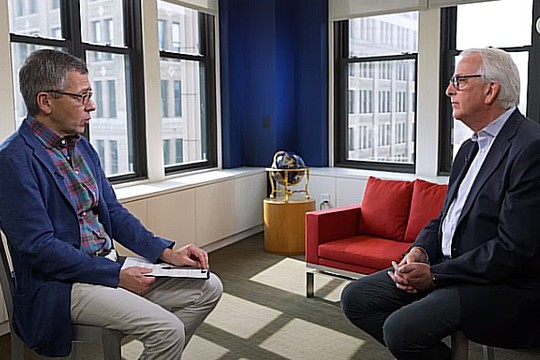Ian Bremmer (right) and former US Ambassador to NATO Ivo Daalder (left).
As tensions between Russia and NATO continue to escalate, Ian Bremmer and former US Ambassador to NATO Ivo Daalder discuss on GZERO World the perspective of non-Western countries, which are walking a complicated geopolitical tightrope between the two sides.
Nations like India, Brazil and South Africa have a strong diplomatic and economic ties to both Russia and the West. They're being put in a difficult position of condemning the war in Ukraine without supporting Western-led sanctions, which are creating high fuel prices and rising inflation for their own citizens.
Ivo Daalder said in this conversation:
“Now, there is of course an enormous difference between the way the collective West feels about Putin and everyone else feels about the West, everyone else feels about Russia, feels about the war. I mean India is a strong member of the Quad, partner in many ways of the West, but their relationship with Russia is virtually identical to China's relationship with Russia. South Africa's perspective is very aligned. Brazil, Mexico.
“So I mean, as soon as you get out of the collective West, suddenly it's not talk about war crimes. It's not talk about Ukraine has to be redressed no matter what. It's, "These sanctions are hurting us, we need to keep doing business with the largest country geographically in the world with all their resources, and you guys are hurting us."
“What do we do about that? It's a real problem. And I think people in the White House and in the chancelleries and the Elysees and other places are spending a lot of time thinking about, how do we change not only the narrative, because the narrative is important, and clearly the Russians were very good at saying, "Everything that you're suffering as a consequence of this war, higher fuel prices, less food and therefore higher food prices, and everything else came from it is because of the sanctions that the West has inflicted," as opposed to, "Well, wait a minute, why did these sanctions get inflicted and imposed in the first place?"
“And I think the West sort of believing that, because they had a pretty darn good vote in the UN General Assembly, 140 plus countries condemning the invasion, but not in supporting the sanctions. They thought, "Well, everybody of course understands this is terrible thing and we have to do something. We're not going to war directly. So therefore we are imposing sanctions. And, by the way, we will allow, of course, food and other agricultural products to be exported."
“And in fact, that is the reality. The reality is when you're the man or a woman on the street in Brazilia or in Johannesburg or, frankly, in Delhi and your fuel and food prices have gone up, you're gonna say, "Wait a minute, where's the problem here? It must be the West. It's not Russia." And so trying to figure out a way to start talking about this in a different way is one part of it.
“And there is a question, at what point does military confrontation start to compete more effectively with diplomatic engagement?
“After all, this war, at a low intensity point, it started in 2014. It's been going on for almost nine years...”
read more in our Telegram-channel https://t.me/The_International_Affairs

 11:34 04.05.2023 •
11:34 04.05.2023 •























